This article is part of an editorial collaboration with Heifer International. It was first published on the Heifer International blog.
— —
Drought, malnutrition and restrictive gender roles challenge the women of rural Senegal every day. Heifer International is helping them ease their daily burdens by digging wells, improving diets and starting savings groups that help small businesses grow.
RAIN FALLS IN THE DRIEST PARTS OF SENEGAL only sporadically over a few months of the year. For a handful of weeks from July to September, the crusty band of earth at the southern edge of the Sahara Desert comes to life. Cracked ground sprouts green shoots, bald baobab trees leaf out and farmers race to plant seeds in the fields.
By November, the ground is dry again. Sheep and goats nip at dwindling pools at the crenulated edges of red dirt basins. The temporarily green landscape fades back to brown and fields go lifeless. This feast-and-famine cycle shapes the rhythms of life in the Sahel, a hot and dusty region that reaches across northern Africa from the Atlantic to the Red Sea.
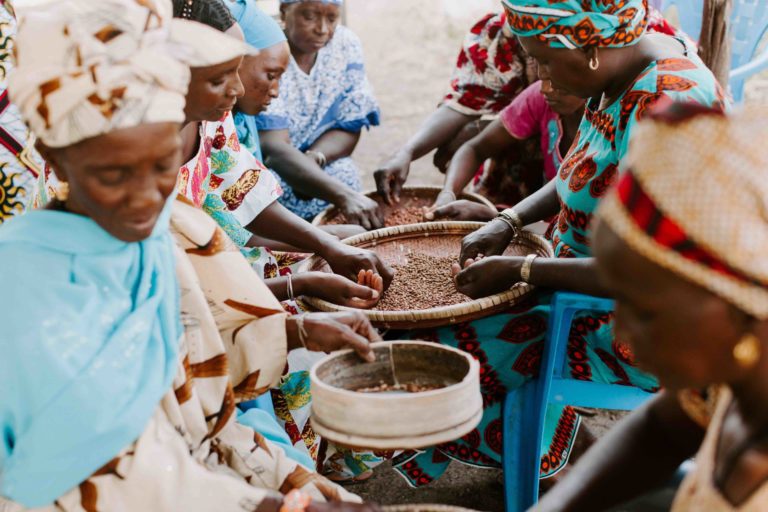
While the cosmopolitan coastal capital of Dakar offers up all the modern conveniences, rural Senegal is less comfortable. That’s especially true in the northern part of the country, which falls in the Sahel and goes desperately thirsty for the majority of the year. Any oasis you might find here is a man-made one. Or, in the case of the oasis at Younoufere, woman-made. Heifer International has long worked in the Sahel, helping farmers survive in an increasingly harsh and dry environment. While local deforestation and overgrazing add to the problem, scientists now believe the real drivers of desertification in the Sahel are rising ocean temperatures and global greenhouse gas emissions. Changing weather patterns are sending more rain to eastern parts of the Sahel but keeping the western edge, including Senegal, drier than before.
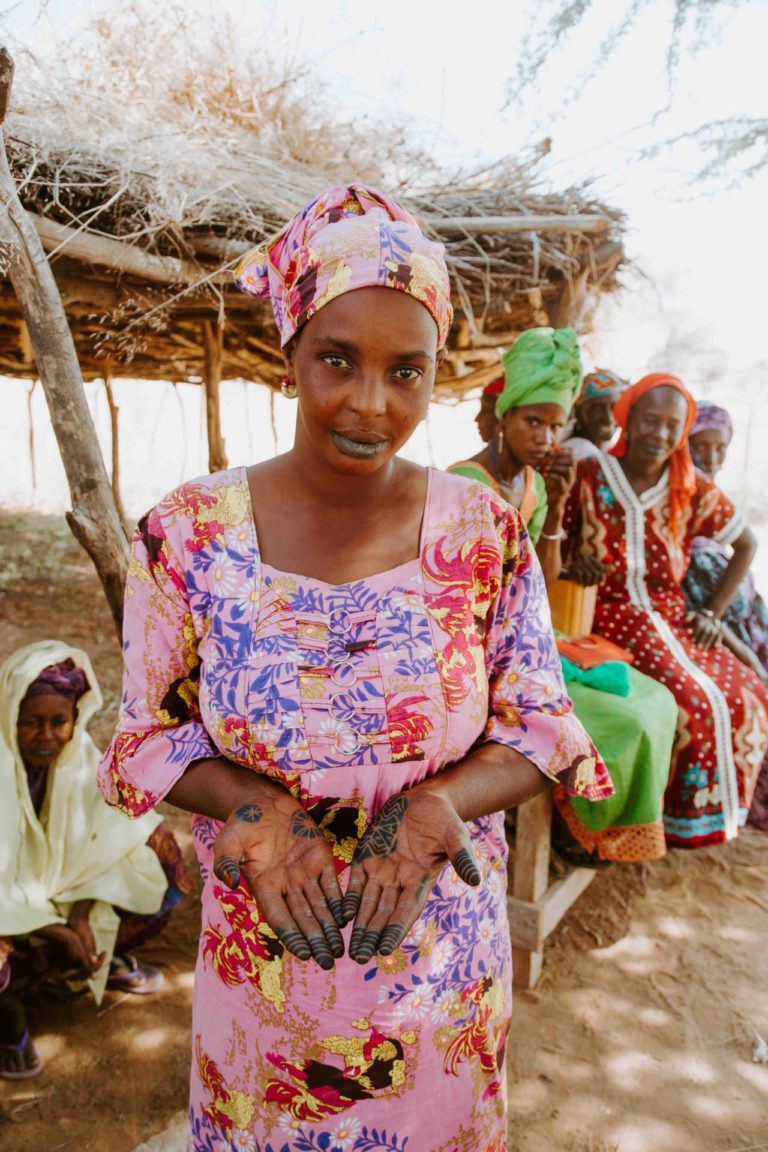
So the women dreamed bigger. Heifer International and the federation of women’s groups teamed up to bring in a solar-powered well-digging machine and to design a plan to maximize this new water source. A brand new solar-powered borehole flanked by gardens and watering troughs for livestock is the result. This 5-acre gated oasis employs one male from security patrol services who also helps pump water for paying customers from 8 a.m. to 8 p.m. daily. But inside the gates, the women take charge. In brightly patterned dresses and headwraps and with intricate tattoos on their hands and feet, the women tending this unexpected patch of fecundity make for a refreshing sight. Veils of mesh protect seedlings from the harsh sun, and dogs chase away hungry rabbits. Spiky trees planted along the garden’s perimeter keep out nibbling goats and hair sheep. For now, only a few garden beds cluster around the well, but eventually pipes will carry water to eight other points within the fence, ultimately allowing the women to grow large quantities of produce year-round. For the women of Younoufere, that changing weather pattern has real-life repercussions every day. While counting on seasonal rains to water the crops was always a gamble, in recent years it’s a predictably bad bet. And the town well, a rusty and temperamental beast of a contraption at the mercy of an unreliable electricity supply, can no longer keep up with demand. Because fetching water is still considered a woman’s job in rural Senegal, the scarcity of water became the women’s problem. A federation of three women’s groups in Younoufere initially asked Heifer International for help digging deeper and broader watering holes. But a study revealed the water would quickly evaporate or sink into the ground.
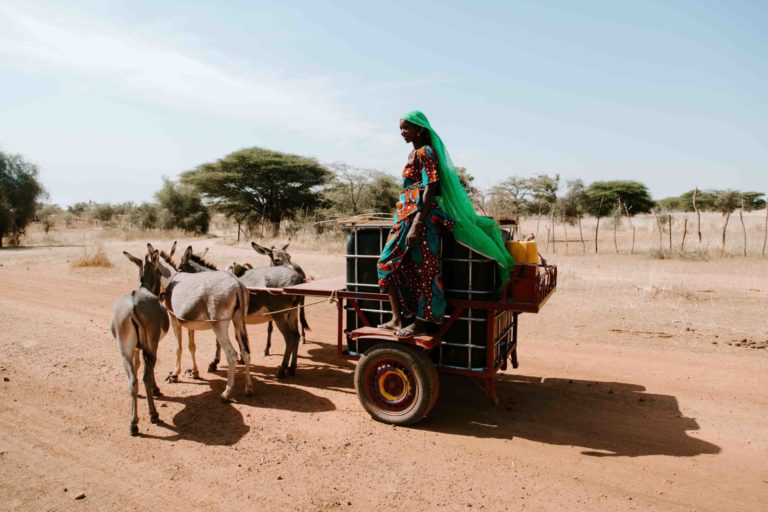
“We used to not have vegetables in the dry season,” said Mariame Sow, president of the Younoufere women’s group. She comes to the garden for a couple of hours most days. All jobs at the household level are the responsibility of women, and that includes fetching water and providing food, she explained. With the new garden and well, these responsibilities are far easier to meet.
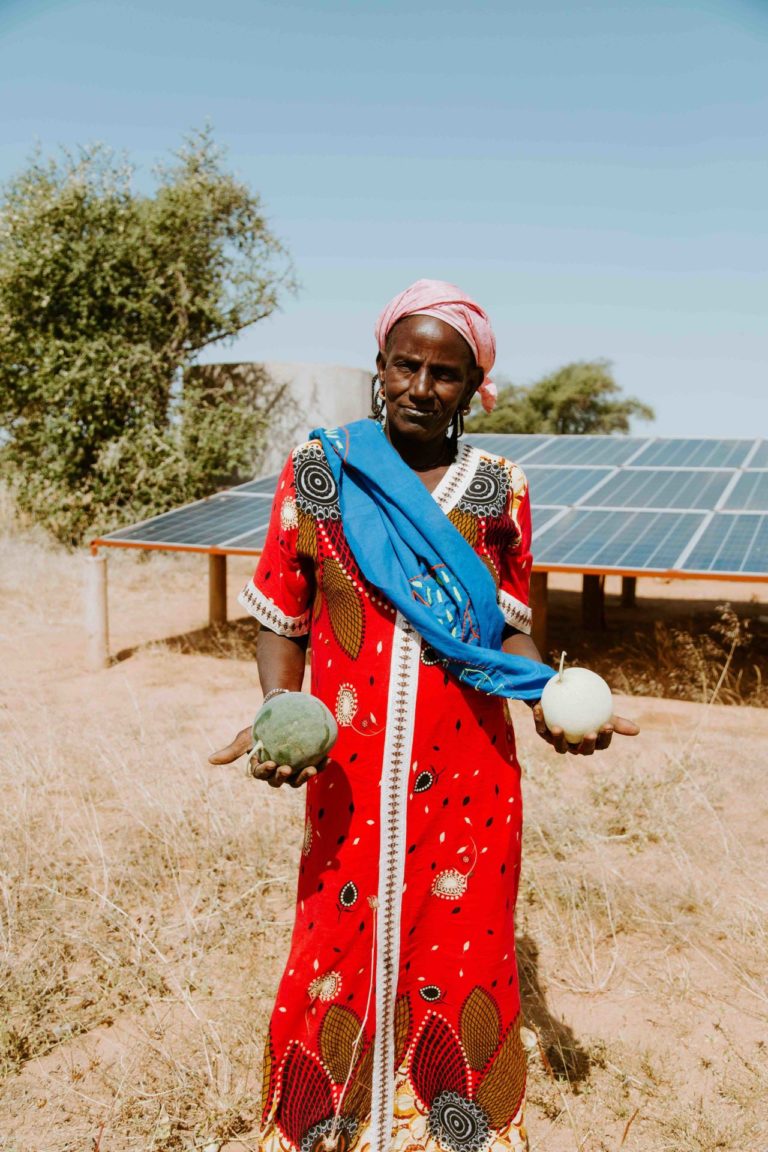
The federation of women overseeing the garden includes three groups, each with 50 or more members. And the groups take turns, usually working together two hours a day or more to bring along plots of onions, hibiscus flowers, beans, okra, maize and watermelons. So far, crop yields are enough to save the women from having to buy vegetables but not enough to sell. They’re already bringing in money from selling water, making enough to buy seeds and extend irrigation pipes to the far edges of the garden. They’re also paying a fair wage to their full-time security guard and water pumper, whose long hours are dictated by the sunshine. “We pay him for seven days a week,” Sow said. “He’s there from 8 a.m. to 8 p.m. sometimes. Whenever the sun works, he works, because that’s when the water can flow.”
While they laughed when asked why the men don’t help in the garden, they admitted their frustration is real. Many of their husbands spend their days walking their herds to a watering hole, then sitting in the shade and drinking tea. They could do far more, said Dade Mama Sow, another group member. “The problem really needs to be addressed. The men are getting the benefits and not doing anything.”Optimistic about their quick success, Sow and other members of the women’s federation still have plenty of worries. Malnutrition is common, healthy food is difficult to grow even with a good well, and the burden of providing healthy meals to the family continues to fall on women’s shoulders alone.
THE MAGIC MIX
More than 100 miles and on the other side of Gambia from Senegal’s dusty North, the balmy southern districts feel like a different country altogether. Tangled mangroves grow along the busy Casamance River, where fishermen in colorful handmade boats set nets. The air is thick with humidity, and monkeys chatter in thick canopies. Baobab trees in the arid North remain naked and dormant most of the year, waiting for seasonal rains before leafing out. But in the South, edible fruit in velvety green pouches hangs from leafy baobab branches like Christmas ornaments.
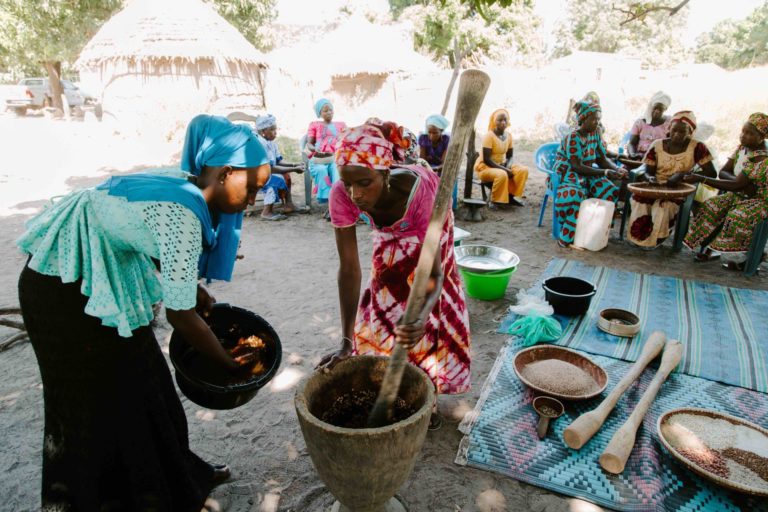
The generous landscape of the South doesn’t translate to a more bountiful economy, however. The Kolda and Kaffrine regions are among Senegal’s poorest, and malnutrition levels are high. Heifer International is sharing goats, sheep and chickens with families here in hopes of improving diets and helping struggling households achieve living incomes, which is the amount they need to maintain a decent standard of living. In the Kolda region, a living income is the equivalent of about $1.14 per person per day.
Focusing only on income isn’t enough because more money doesn’t automatically translate into healthier diets, said Lyna Manga, a nutritionist based in Heifer’s Kolda office. Pressure on farmers to grow food for markets rather than home consumption means vegetables and protein often get left off the plate. “The typical diet is rice and millet. Almost their entire diet is this,” she said. Rice, hamburgers and inexpensive junk food are increasingly popular. All these foods fill bellies but provide very little in terms of nutrition.
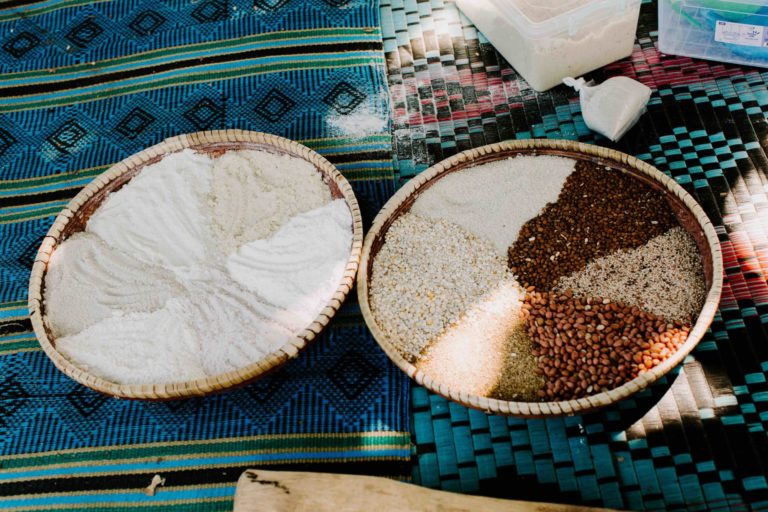
“There are very few schools that teach nutrition,” Manga said. “The food pyramid is not part of the curriculum, and people really don’t know the basics. People just eat to survive, whatever they can get.” Meals are typically served in a communal bowl, with vegetables and proteins in the middle and grains around the edges. Children are expected to eat only from the starch-heavy edges, leaving the most nutritious parts for the adults. Heifer projects in the region incorporate classes on the basics of good nutrition in hopes of changing these habits. The projects are also helping moms combine common, readily available grains and legumes into a versatile and easy-to-prepare flour that’s improving children’s health, boosting their energy and putting them on a path to more opportunity.
In the rural community of Siinthiag Fodè, Heifer gave women sheep and training in how to raise the animals for sale. But learning how to provide better food for their children tops the priority list at the project participants’ weekly meeting, held in a shady clearing under a mango tree. The straight rows of round thatched huts with dirt floors swept to
a polish sit mostly empty as residents gather at the circular clearing on the edge of the neighborhood. Children and chickens play at the edges of the tight circle of women and a few men clustered on a woven mat for their weekly nutrition lesson.
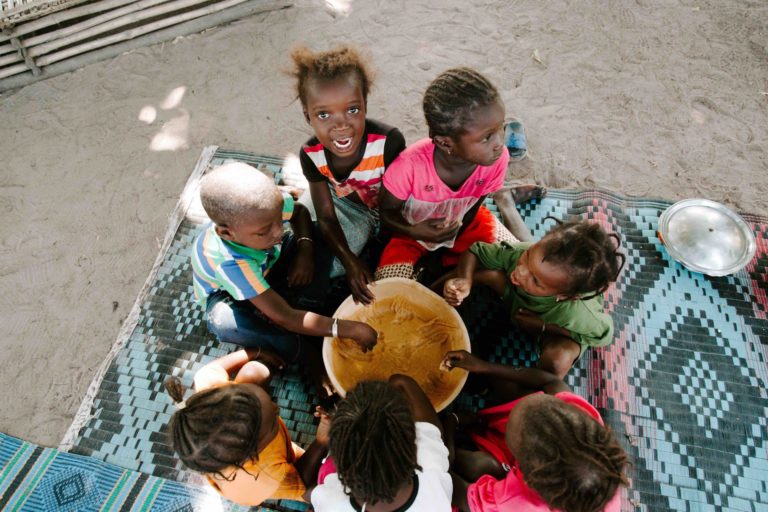
Group leader Banna Mballo, 25 and the mother of two, went to school through 11th grade, but most of the residents of Siinthiag Fodè never got nearly that far, and many of them can’t read. So Mballo uses an oversized flipbook filled with illustrations and no words for her trainings.
She flips to the day’s lesson and holds up the book, then asks the group what they see: children playing, a child eating, palm oil, water, sweet potatoes. These are foods that yield energy, Mballo explained in Jola, the language commonly spoken in the region. “If children eat these foods, it’s like a battery for a flashlight. If a flashlight does not have a battery it will not shine.” The next illustration shows meat, fish, milk, legumes and eggs. “If a child eats these, it is like building blocks. It will strengthen the child, and he will grow healthy,” she said.
Related Articles: Rural Women Must Be at the Heart of COVID-19 Response and Recovery | Zero Hunger Generation – The Road Is Paved
The last illustration of the day shows piles of fruit and vegetables. “These foods protect the child. It’s like a key to a room. It protects the room,” Mballo said. “For a child to eat a balanced diet, he needs all three of these things: energy, building blocks and protection.”
With the lesson over, the women work together on a fresh batch of the seemingly magic mix that’s made a quick and significant difference in the health of babies and children here. Circled around a tall, narrow basin, trios of women with long wooden dowels smash millet in a perfectly timed 1-2-3 polka rhythm, then flip it in shallow baskets to remove the chafe. Mixed with roasted peanuts, ground maize and other grains, this mixture keeps well and provides nutrients for children when fresh meat and vegetables aren’t on offer.
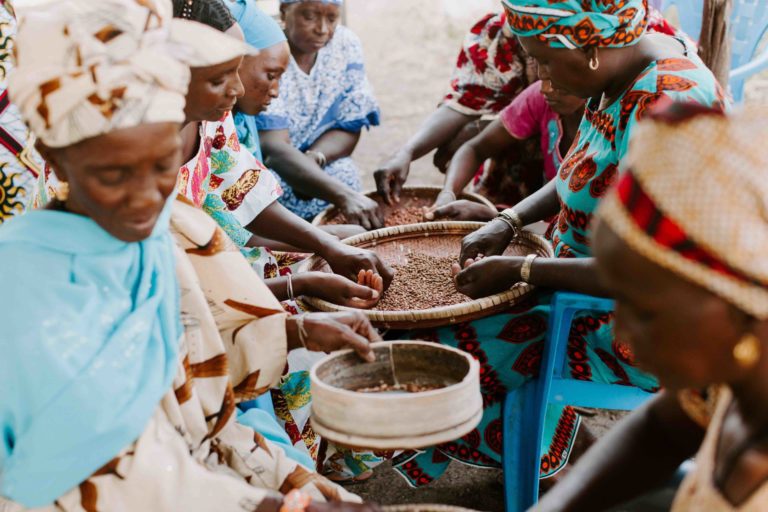
Monthly weigh-ins for children once caused worry for Ansatou Baldè, a rice farmer and mother of four whose children used to eat millet porridge and little else. Now, clean hair sheep in tidy pens hold the promise of income, and the magic grain and legume mix, which Baldè stirs together with salt, palm oil, baobab fruit and a dash of sugar, are helping the children put on weight. The three girls and one boy sleep better and have more energy, and they’re doing better in school. With good educations, Baldè thinks her children can help her maximize her farm’s potential.
“I send them to school so they can come back and help me do things I couldn’t do,” she said.
A BOX WITH THREE LOCKS
The St. Peter Savings and Loan group meets every other Sunday afternoon in a breezy alley next to Marie Bassene’s bar. At every meeting, each member is expected to bring 200 West African CFA francs, the equivalent of about 35 cents, to go in the communal solidarity pot set aside for crises and celebrations. But members can also contribute up to 2,500 CFA (roughly $4) per month to the loan fund from which all members can draw.
Many Heifer projects around the world incorporate savings groups like this one to ensure project participants can continue building their farms and businesses long into the future. Most of the 35 member families of St. Peter are raising swine and growing gardens as part of a Heifer project, and they’re using the savings group to grow their operations. Members can borrow up to three times the amount they have contributed to the fund, at an interest rate of 10 percent. So far, the group reports zero defaults.
Any money on hand lives in a lockbox with three locks, with the keys held by three different group members. Security is really not much of a concern though, since contributions get put to work quickly so there’s rarely much cash sitting idle. Members seeking a loan present their plans, then other members vote. Loans have ranged from 1,500 CFA (about $2.50) to 70,000 CFA ($115), all used to invest in animals, seeds or improved fodder. The goal is to ramp up productivity and income, then reinvest to grow more.
While members’ financial strengths are not the same, the goal is to make sure every member has an equal opportunity to invest and grow, group President Jon Bautiste said. “If we want to do something, everyone has a say. We don’t leave anyone behind.”
Editor’s Note: The opinions expressed here by Impakter.com columnists are their own, not those of Impakter.com. — In the Featured Photo: Women carrying water home from the well in Linguere, Senegal. Featured Photo Credit: Lacey West.









